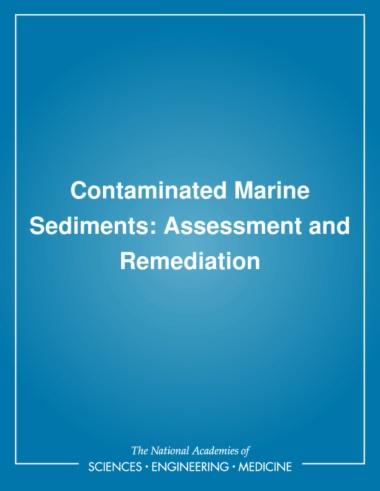The pervasive, widespread problem of contaminated marine sediments is an environmental issue of national importance, arising from decades of intentionally and unintentionally using coastal waters for waste disposal. This book examines the extent and significance of the problem, reviews clean-up and remediation technologies, assesses alternative management strategies, identifies research and development needs, and presents the committee's major findings and recommendations. Five case studies examine different ways in which a variety of sediment contamination problems are being handled.
- Cover
- Front Matter
- Executive Summary
- Findings and Recommendations
- Workshop Summaries
- I. Extent of Contamination
- National Perspective on Sediment Quality
- National Status and Trends Program for Marine Environmental Quality
- II. Classification of Contaminated Sediments
- Use of Apparent Effects Threshold Approach (AET) in Classifying Contaminated Sediments
- The Use of the Sediment Quality Triad in Classification of Sediment Contamination
- A Review of the Data Supporting the Equilibrium Partitioning Approach to Establishing Sediment Quality Criteria
- Marine Sediment Toxicity Tests
- III. Significance of Contamination
- Effects of Contaminated Sediments on Benthic Biota and Communities
- Sediment Contamination and Marine Ecosystems: Potential Risks to Human Health
- IV. Mobilization and Resuspension
- Predicting the Dispersion and Fate of Contaminated Marine Sediments
- Computer Simulation of DDT Distribution in Palos Verdes Shelf Sediments
- V. Assessment and Selection of Remedial Technologies
- Management Strategies for Disposal of Contaminated Sediments
- Alternatives for Control/Treatment of Contaminated Dredged Material
- Developments in Equipment Designed for Handling of Contaminated Sediments
- Monitoring the Effectiveness of Capping for Isolating Contaminated Sediments
- Remedial Technologies Used at International Joint Commission Areas of Concern
- Economic Considerations of Managing Contaminated Marine Sediments
- VI. Case Studies
- New Bedford Harbor Superfund Project
- Physical Transport Investigations at New Bedford, Massachusetts
- PCB Pollution in the Upper Hudson River
- Contamination of the Hudson River -- The Sediment Record
- Kepone and the James River
- Assessment of Contaminated Sediments in Commencement Bay (Puget Sound, Washington)
- St. Paul Waterway Remedial Action and Habitat Restoration Project
- Dredging and Disposal of Contaminated Marine Sediment for the U.S. Navy Carrier Battlegroup Homeport Project, Everett, Washington
- Appendix A Biographies of Committee Members
- Appendix B Coastal States Survey
- Appendix C Workshop Participants
- Appendix D Agenda

